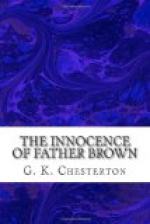and superior. He saw her daughter, Lady Margaret
Graham, a pale and pretty girl with an elfish face
and copper-coloured hair. He saw the Duchess
of Mont St. Michel, black-eyed and opulent, and with
her her two daughters, black-eyed and opulent also.
He saw Dr. Simon, a typical French scientist, with
glasses, a pointed brown beard, and a forehead barred
with those parallel wrinkles which are the penalty
of superciliousness, since they come through constantly
elevating the eyebrows. He saw Father Brown,
of Cobhole, in Essex, whom he had recently met in
England. He saw—perhaps with more
interest than any of these—a tall man in
uniform, who had bowed to the Galloways without receiving
any very hearty acknowledgment, and who now advanced
alone to pay his respects to his host. This
was Commandant O’Brien, of the French Foreign
Legion. He was a slim yet somewhat swaggering
figure, clean-shaven, dark-haired, and blue-eyed,
and, as seemed natural in an officer of that famous
regiment of victorious failures and successful suicides,
he had an air at once dashing and melancholy.
He was by birth an Irish gentleman, and in boyhood
had known the Galloways—especially Margaret
Graham. He had left his country after some crash
of debts, and now expressed his complete freedom from
British etiquette by swinging about in uniform, sabre
and spurs. When he bowed to the Ambassador’s
family, Lord and Lady Galloway bent stiffly, and Lady
Margaret looked away.
But for whatever old causes such people might be interested
in each other, their distinguished host was not specially
interested in them. No one of them at least
was in his eyes the guest of the evening. Valentin
was expecting, for special reasons, a man of world-wide
fame, whose friendship he had secured during some of
his great detective tours and triumphs in the United
States. He was expecting Julius K. Brayne, that
multi-millionaire whose colossal and even crushing
endowments of small religions have occasioned so much
easy sport and easier solemnity for the American and
English papers. Nobody could quite make out whether
Mr. Brayne was an atheist or a Mormon or a Christian
Scientist; but he was ready to pour money into any
intellectual vessel, so long as it was an untried
vessel. One of his hobbies was to wait for the
American Shakespeare—a hobby more patient
than angling. He admired Walt Whitman, but thought
that Luke P. Tanner, of Paris, Pa., was more “progressive”
than Whitman any day. He liked anything that
he thought “progressive.” He thought
Valentin “progressive,” thereby doing
him a grave injustice.




